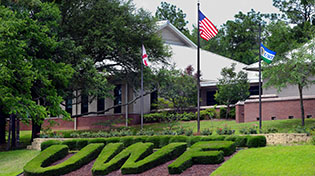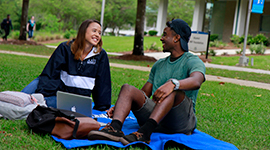First-Year Composition
Preparing students for reading and writing projects in their University courses.

While first-year composition may be a service course in which the goal is to meet the needs of the academic community, we believe the best way to meet those needs is by teaching critical literacy, that is, teaching students to think, read (listen, view, watch, perceive), and write critically. Within this overarching goal are the following subordinate goals:
- Preparing students for their reading and writing projects in their university courses.
- Preparing students for critical citizenship beyond the classroom and the university.
We believe the goals of the larger academic community and, more importantly, our culture and democracy will be best served by our pursuit of these goals together. Our pursuit of said goals will be based on the rhetorical approach to composition and the development of skills of critical thinking, reading, and writing, that is, the development of critical literacy, including media and cultural literacies. If literacy means the ability to read and write functionally, then media literacy and cultural literacy compromise the ability to express oneself clearly in writing and the ability to read critically the range of messages transmitted by all of the vehicles of cultural production, particularly the news and entertainment media. In practice, writing projects will be based on real-world genres rather than genres manufactured specifically for the writing classroom. Writing, whether academic or public, comes from research. Both academic writing and the best public writing honor this principle, though in different genres. Therefore, it is essential to teach sound research techniques that will be supported by our focus on critical reading.
BASIC TENETS
- Democracy is best sustained by an educated and informed public versed in the practices of critical perception and expression.
- University students need preparation not only for their academic careers but also for dealing with the world at large beyond the campus. This preparation should include the teaching of those practices of critical perception and expression that will enable them to become contributing members not only of the academy but also of the democratic public.
- Composition courses teach not only writing but also critical reading, evaluation, and synthesis of information and ideas.
- Students learn best to write in real genres by practicing those real genres, as opposed to artificial genres manufactured exclusively for the writing classroom.
- All good writing, academic or public, is based on sound research.
PHILOSOPHY
While first-year composition may be seen as a service course in which the goal is to meet the needs of the academic community, we believe that the best way to meet those needs is by teaching critical literacy, that is, teaching our students to think, read (listen, view, watch, perceive), and write critically. Within this overarching goal are the subordinate goals of 1) preparing first-year composition students for their reading and writing projects in their other university courses and 2) preparing them for critical citizenship beyond the writing classroom and the university. We believe that the goals of the larger academic community and, more importantly, of our culture and democracy will be best served by our pursuit of these goals together.
Our pursuit of said goals will be based on a rhetorical approach to composition and the development of the skills of critical thinking, reading, and writing, that is, the development of critical literacy, including media and cultural literacies. If literacy means the ability to read and write functionally, then media literacy and cultural literacy comprise the ability to read critically the range of messages transmitted by all the vehicles of cultural production, particularly the news and entertainment media, and to clearly express, in writing, the results of that critical reading activity.
In practice, writing projects will be based on real-world genres rather than genres manufactured specifically and exclusively for the writing classroom. Writing, whether academic or public, comes from research. Both academic writing and the best public writing honor this principle, though in different genres. Therefore it is essential to teach sound research techniques, which will be supported by our focus on critical reading.
English Composition I
In Composition I, the focus will be on building the skills necessary for academic research and writing and on introducing the student to the relationships between academic and public writing.
Because there is no such thing as a uniform academic paper, but rather a range of kinds of academic papers whose requirements and goals are determined by each discipline, students will learn not how to write that non-existent academic paper, but rather the conventions of engagement in critical discourse for academic purposes and genres. Our focus will be on teaching research methods, engagement with sources, and what we think of as preparatory writing, leading to a researched argument.
Next, students will study the relationships between academic and public writing—particularly the importance of sound research to all good writing, whether academic or public—and will begin the practice of using their research to produce public genres related to but clearly differing from academic genres.
Meanwhile, students begin to develop cultural and media literacies, particularly with respect to how we are all shaped as political and social subjects by the texts that constitute the environment in which we are all necessarily immersed.
English Composition II
In Composition II, students will work more specifically on becoming citizen critics with 1) a more specific focus on public reading and writing and 2) refined development of political and cultural literacies. Students learn the ways in which knowledges are either included in or excluded from public spheres, develop an understanding of how to participate in civic discourse and activism, as well as the limitations on, opportunities for, and discipline-related approaches to civic engagement in the American political scene.
Students build on the skills established in Composition I, doing more focused research, but now aimed at the production of writing projects in public genres appropriate to particular writing situations.

ENC 1101 Student Learning Outcomes
Develop a writing project through multiple drafts
Clearly and effectively communicate your ideas
Apply surface features of writing, correctly identifying patterns of errors
Incorporate appropriate and accurate conventions in terms of research and source citation
Reflect on your writing process through analysis of revision and drafting
ENC 1102 Student Learning Outcomes
Clearly and effectively communicate your ideas
Use key rhetorical concepts through analyzing and composing a variety of texts
Evaluate audience and select an appropriate genre and medium based on purpose and context
Select digital environments, media, and genre for production of texts, research, and collaboration
Synthesize and analyze to determine effective integration of sources into writing projects
Related Pages
Program Contact
Contact Dr. Bre Garrett
Director of Composition
Department of English, Building 50/207
850.474.2923
rgarrett@uwf.edu
Tour Our Campus!
Schedule a guided campus tour and visit the University of West Florida today!
Apply Now
At UWF, we realize that each student has individual aspirations. That's why we offer a unique educational experience that paves the way for you to impact the world through an exciting career. Ready to start your journey?



